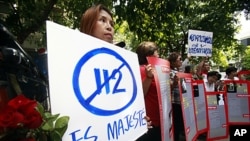Thai police have arrested U.S. citizen Lerpong Wichaikhammat, 54, and charged him with defaming the revered monarchy for an alleged offense dating to a four-year-old post on his blog.
Insulting the monarchy, known as "Lese Majeste", is a serious crime in Thailand that is punishable by up to 15 years in prison. Rights groups and academics have criticized the controversial law and say Thai authorities abuse it for political purposes.
The alleged offense appears to have occurred years ago, when he was living in the U.S. state of Colorado, where he spent 30 years.
Thai police say Lerpong, who also goes by the name Joe Gordon in the United States, provided a link on his blog in 2007 to the book “The King Never Smiles."
The unauthorized biography of 83-year-old King Bhumibol Adulyadej is deemed critical of the Thai royal family and is banned in Thailand.
Gordon was arrested on Tuesday in northeastern Nakhon Ratchasimaand province where he has been living for the past year. In addition to the Lese Majeste charge, he is accused of violating Thailand’s Computer Crimes Act for committing Lese Majeste online.
It is not clear why authorities decided to arrest Gordon now, but rights activists say there has been increasing use of the law to silence critical voices and political opponents.
Benjamin Zawacki, Asia researcher for Amnesty International, spoke about the controversial law this week at the Foreign Correspondents Club of Thailand.
“Although the Lese Majeste law has been on the books for decades, during Thailand’s ongoing political crisis, which began in late 2005, it has been used more vigorously amidst a worsening climate for political expression,” said Zawacki.
A spokesman at the United States Embassy in Bangkok says a consular official visited Gordon on Friday and that they are following his case closely.
Zawacki says the law, as currently drafted, means Thailand is violating its international legal obligations to protect freedom of speech and that it should be changed.
Thai authorities say the strict law is necessary to protect the revered monarchy from slanderous attack and to ensure national security.
Zawacki says it is clearly a legal and factual stretch to claim that an insulting remark could compromise the security of the nation.
Rights groups and academics have decried authorities’ increasing use of the law to silence critics and opposition politicians.
A Thai historian and an editor of opposition Red Shirt news magazines were recently charged with Lese Majeste.
Thai authorities have also charged 18 leaders of the Red Shirts movement.
Gordon would not be the first to be charged with Lese Majeste for posting someone else’s writing.
The editor of the online magazine Prachatai, Chiranuch Premchaiporn, was charged last year on several counts of Lese Majeste for bloggers’ postings on her website.
Authorities say that although she did not post them herself, she did not remove the offending messages quickly enough and could be sentenced to several decades in prison.









